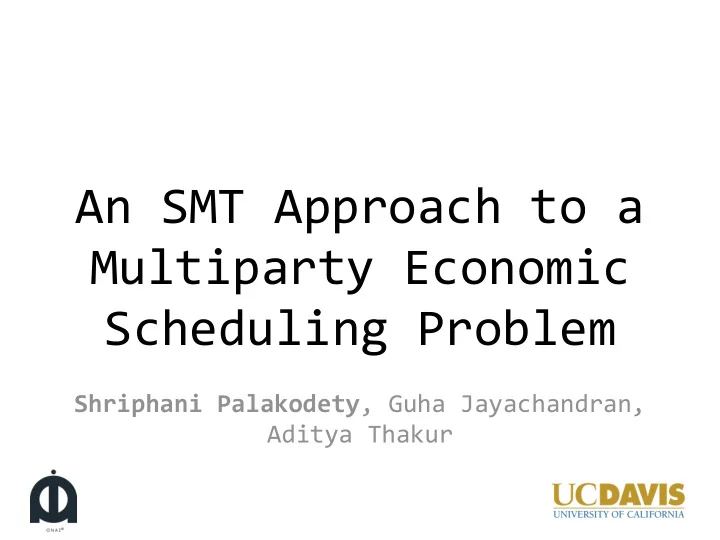

An SMT Approach to a Multiparty Economic Scheduling Problem Shriphani Palakodety , Guha Jayachandran, Aditya Thakur
Setting • Marketplace • Matching buyers / sellers • Buyer constraints • Seller constraints • Matching must honor both
Setting • Cryptocurrency network • Offer and Request computation • Payment through cryptocurrency • Constraints specified on both sides • Match Requester and Offerer
Setting • Rich specification: • Combine requests and offers • Offer algorithm X only if algorithm Y is provided (for example) • Price constraints on what you can offer/buy • Time constraints like timeouts, schedule- after-x etc. • Rich operator algebra
Goals • Match requests and offers • Satisfy constraints • Optimize some metrics: • Number of participants included • Maximizing earnings • Etc.
Goals II • Real-time (ish) • Quick enough so the network doesn’t stall • Handle a large body of participants
What We Evaluate Against • Hardware (GPU) accelerated solution • SIMD - Single Instruction Multiple Data
Formalism • ServiceCall - unit • Request / Offer • { “named-entity-recognition”: offer, “part-of-speech-tagger” : request }
Formalism • AllOf / OneOf - operators • OneOf( AllOf({ “named-entity-recognition”: offer, “part-of-speech-tagger” : request }), AllOf({ “named-entity-recognition”: offer, “word2vec-embeddings” : request }), )
Formalism • Pricing Constraints • { OneOf( AllOf({ “named-entity-recognition”: offer, “part-of-speech-tagger” : request }), AllOf({ “named-entity-recognition”: offer, “word2vec-embeddings” : request }), ), Price: >=20 }
Formalism • We call this a Commitment: • OneOf( AllOf(...), AllOf(...) ), price: >=20
Scheduler • Put together a collection of commitments • The collection satisfies some constraints
Commitment Constraints • If a commitment is scheduled, exactly one of the OneOf operands must be scheduled • If a commitment is not scheduled, none of the OneOf operands must be scheduled
AllOf Constraints • If an AllOf is scheduled, all of the constituent ServiceCalls must be scheduled • If an AllOf is not scheduled, none of the constituent ServiceCalls must be scheduled
ServiceCall Constraints • If a ServiceCall request is scheduled, exactly one offer must be scheduled for it • If a ServiceCall offer is scheduled, at least one request must be scheduled for it
Also, • Schedule at least one Commitment • So the problem becomes unsat • Additionally 1 variable per ServiceCall p(S) where S is a ServiceCall • AllOf scheduled in a Commitment: • For each ServiceCall in this AllOf: • Add +p(S) if ServiceCall is offered • Add -p(S) if ServiceCall is requested
Setup • Pseudobooleans for each Commitment - C i • Pseudobooleans for each AllOf - C i -A i • Real valued prices for each ServiceCall - p(S)
Setup • Run encoding through Z3 • Optimize using Z3-opt
Optimize • # of Commitments scheduled • maximize Σ C i
Baseline • GPU Encoding • Solves just the matching problem • Pricing not solved
GPU Kernel • Encode AllOf • Exploit “+” (SIMD GPU) to mean scheduling AllOfs • Regularly prune
AllOf Encoding Service Call Portion [ 0, 1, 0, 1, 1, 0, 0, 0, 1] Request/Offer Commitment Portion Indicators
Take 2 Of These [ 0, 1, 0, 1, 1, 0, 0, 0, 1] + [ 0, 0, 0, 0, 0, 1, 0, 1, 0] = [ 0, 1, 0, 1, 1, 1, 0, 1, 1]
Potential Schedule [ 0, 0, 0, 0, 0, 0, 0, 0, 0]
Potential Schedule [ 0, 0, 0, 0, 0, 0, 0, 0, 0] + [ 0, 1, 0, 1, 1, 0, 0, 0, 1] = [ 0, 1, 0, 1, 1, 0, 0, 0, 1]
Sum = Potential Schedule • Pool of potential Schedules (frontier) • Add next AllOf to each • New pool of potential Schedules (new frontier) • Maintain frontier till all AllOfs are considered • Regularly prune
Prune Heuristic • We are maximizing # of Commitments
Prune Heuristic [ 0, 1, 0, 1, 1, 1, 0, 1, 1] Sum Of These
Thus • Build encoding • Set up initial schedule (all zeros - i.e nothing scheduled) • Pick AllOfs and add to the initial schedule • Get a new set of potential schedules • Prune the list (can’t double schedule offers etc.) • Repeat
Benchmarks • Pool Of ServiceCalls • Create Commitment: • Sample n • N - # of AllOfs in this Commitment • Create Each AllOf: • M - # of ServiceCalls in this AllOf • Randomly make them an offer / request • Randomly sample a price for each Commitment
Hardware • Z3 Scheduler: • Macbook Pro with an Intel(R) Core(TM) i7-5557U CPU @ 3.10GHz with 4 cores • GPU Kernel: • NVidia Tesla K40c graphic card
Key Findings • Z3 encoding is a lot more compact • Solves bigger problems • Substantially faster despite hardware acceleration • Faster at solving the SAT AND Pricing problems
Abundance / Scarcity Scenario • Bias the sampling: • Abundance : Far more offers than requests • Scarcity : Far more requests than offers • 70/30 split
Key Finding • Solver is very fast at dealing with the scarcity case • Slower in the abundance case • Potentially takes longer to finish the optimization step when supply is high
Benchmarks + Results • https://github.com/onai/SMTExperiments
References • de Moura, L., Bjørner, N.: Z3: An efficient SMT solver. In: Tools and Algorithms for the Con- struction and Analysis of Systems (TACAS) (2008) • Kovásznai, G., Biro ́ , C., Erdélyi, B.: Generating optimal scheduling for wireless sensor networks by using optimization modulo theories solvers. In: Proc. Int. Workshop on Satisfiability Modulo Theories (SMT) (2017) • Kasi, B.K., Sarma, A.: Cassandra: Proactive conflict minimization through optimized task scheduling. In: Proceedings of the 2013 International Conference on Software Engineering. pp. 732–741. ICSE ’13, IEEE Press, Piscataway, NJ, USA (2013)
Questions
Recommend
More recommend